Access to Justice: Rights, Procedures, and the Australian Context
VerifiedAdded on 2023/06/04
|7
|1935
|219
Essay
AI Summary
This essay provides a comprehensive overview of access to justice within the Australian legal system. It begins by defining access to justice as a fundamental human right, exploring its multifaceted nature, and emphasizing the importance of fairness and equality. The essay then delves into the Australian legal framework, detailing the roles of various courts, including the High Court, Federal Courts, and State Courts, and how they ensure individuals can register cases and protect their rights. It discusses the rights of juveniles and prisoners to access the courts and emphasizes the components of due legal process, including the right to participate in judicial proceedings, access to relevant documents, and the importance of speedy adjudication. Furthermore, the essay addresses the impact of court fees and complexities within the legal system, as well as the role of non-profit organizations in providing legal assistance. It concludes by highlighting the need for continuous training of legal professionals, objective evaluation of observations, and the implementation of mechanisms to ensure proper management of legal systems without violating human rights. The essay references several case laws and legal resources to support its arguments, making it a valuable resource for understanding access to justice in Australia.
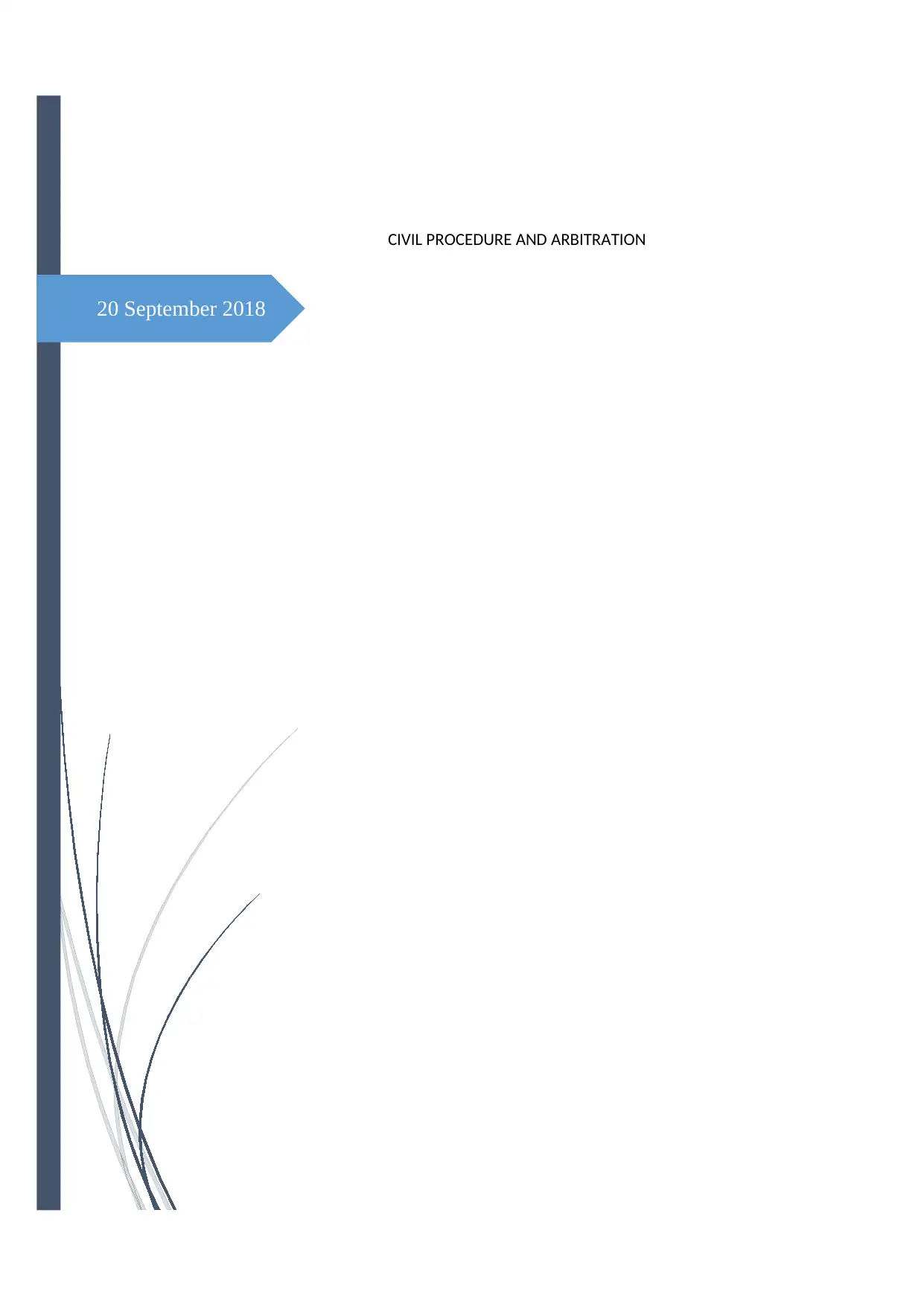
20 September 2018
CIVIL PROCEDURE AND ARBITRATION
CIVIL PROCEDURE AND ARBITRATION
Paraphrase This Document
Need a fresh take? Get an instant paraphrase of this document with our AI Paraphraser
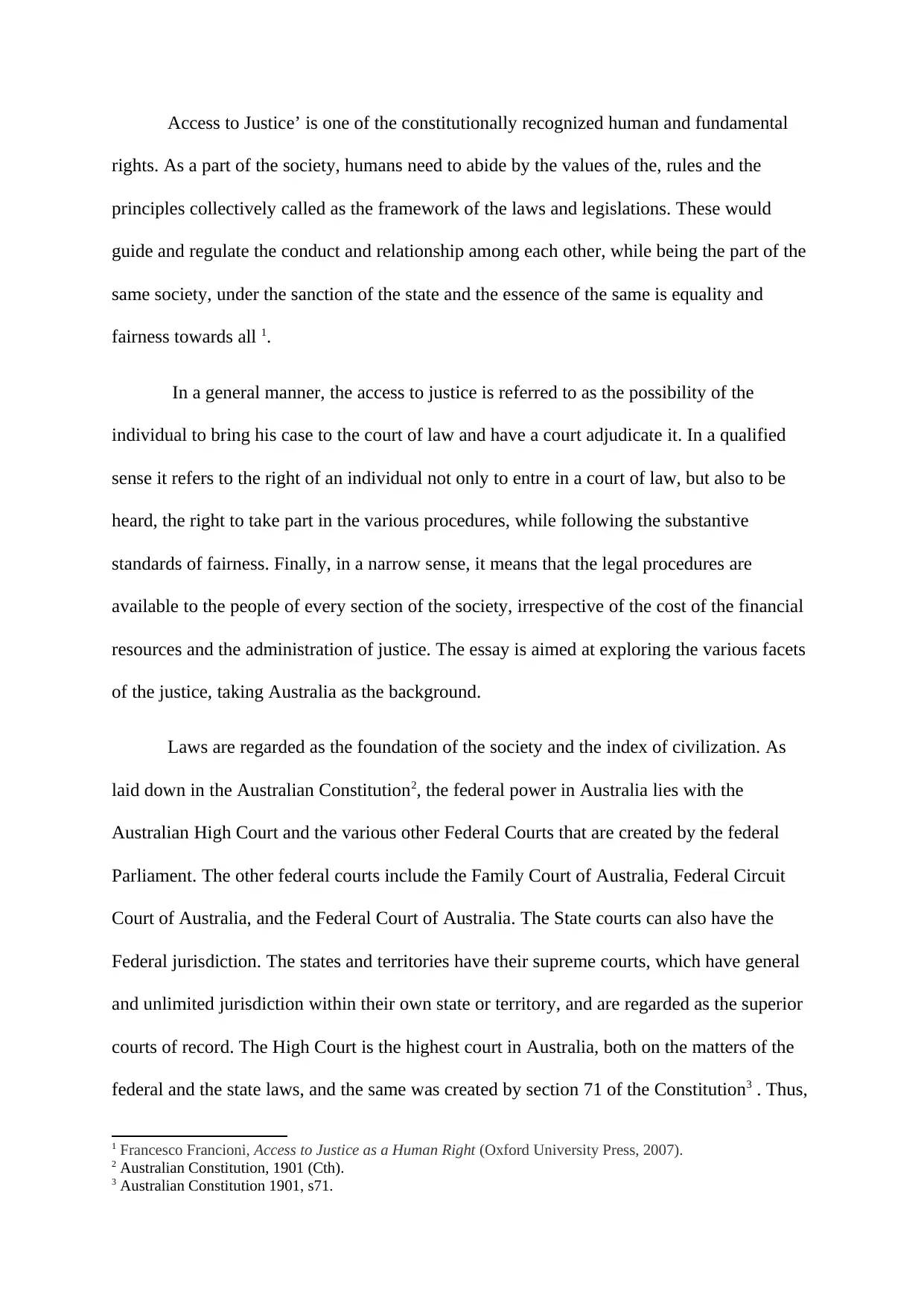
Access to Justice’ is one of the constitutionally recognized human and fundamental
rights. As a part of the society, humans need to abide by the values of the, rules and the
principles collectively called as the framework of the laws and legislations. These would
guide and regulate the conduct and relationship among each other, while being the part of the
same society, under the sanction of the state and the essence of the same is equality and
fairness towards all 1.
In a general manner, the access to justice is referred to as the possibility of the
individual to bring his case to the court of law and have a court adjudicate it. In a qualified
sense it refers to the right of an individual not only to entre in a court of law, but also to be
heard, the right to take part in the various procedures, while following the substantive
standards of fairness. Finally, in a narrow sense, it means that the legal procedures are
available to the people of every section of the society, irrespective of the cost of the financial
resources and the administration of justice. The essay is aimed at exploring the various facets
of the justice, taking Australia as the background.
Laws are regarded as the foundation of the society and the index of civilization. As
laid down in the Australian Constitution2, the federal power in Australia lies with the
Australian High Court and the various other Federal Courts that are created by the federal
Parliament. The other federal courts include the Family Court of Australia, Federal Circuit
Court of Australia, and the Federal Court of Australia. The State courts can also have the
Federal jurisdiction. The states and territories have their supreme courts, which have general
and unlimited jurisdiction within their own state or territory, and are regarded as the superior
courts of record. The High Court is the highest court in Australia, both on the matters of the
federal and the state laws, and the same was created by section 71 of the Constitution3 . Thus,
1 Francesco Francioni, Access to Justice as a Human Right (Oxford University Press, 2007).
2 Australian Constitution, 1901 (Cth).
3 Australian Constitution 1901, s71.
rights. As a part of the society, humans need to abide by the values of the, rules and the
principles collectively called as the framework of the laws and legislations. These would
guide and regulate the conduct and relationship among each other, while being the part of the
same society, under the sanction of the state and the essence of the same is equality and
fairness towards all 1.
In a general manner, the access to justice is referred to as the possibility of the
individual to bring his case to the court of law and have a court adjudicate it. In a qualified
sense it refers to the right of an individual not only to entre in a court of law, but also to be
heard, the right to take part in the various procedures, while following the substantive
standards of fairness. Finally, in a narrow sense, it means that the legal procedures are
available to the people of every section of the society, irrespective of the cost of the financial
resources and the administration of justice. The essay is aimed at exploring the various facets
of the justice, taking Australia as the background.
Laws are regarded as the foundation of the society and the index of civilization. As
laid down in the Australian Constitution2, the federal power in Australia lies with the
Australian High Court and the various other Federal Courts that are created by the federal
Parliament. The other federal courts include the Family Court of Australia, Federal Circuit
Court of Australia, and the Federal Court of Australia. The State courts can also have the
Federal jurisdiction. The states and territories have their supreme courts, which have general
and unlimited jurisdiction within their own state or territory, and are regarded as the superior
courts of record. The High Court is the highest court in Australia, both on the matters of the
federal and the state laws, and the same was created by section 71 of the Constitution3 . Thus,
1 Francesco Francioni, Access to Justice as a Human Right (Oxford University Press, 2007).
2 Australian Constitution, 1901 (Cth).
3 Australian Constitution 1901, s71.
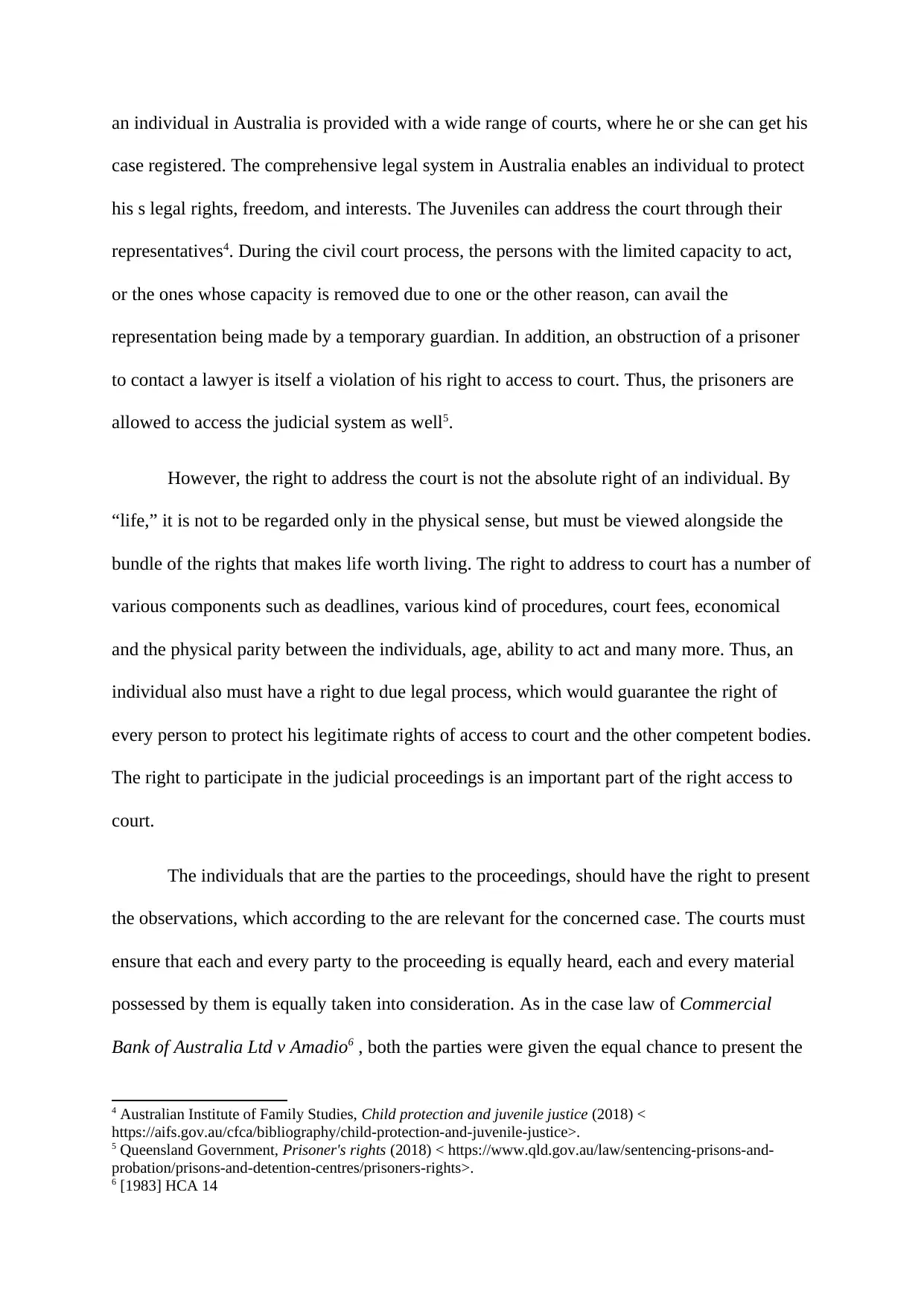
an individual in Australia is provided with a wide range of courts, where he or she can get his
case registered. The comprehensive legal system in Australia enables an individual to protect
his s legal rights, freedom, and interests. The Juveniles can address the court through their
representatives4. During the civil court process, the persons with the limited capacity to act,
or the ones whose capacity is removed due to one or the other reason, can avail the
representation being made by a temporary guardian. In addition, an obstruction of a prisoner
to contact a lawyer is itself a violation of his right to access to court. Thus, the prisoners are
allowed to access the judicial system as well5.
However, the right to address the court is not the absolute right of an individual. By
“life,” it is not to be regarded only in the physical sense, but must be viewed alongside the
bundle of the rights that makes life worth living. The right to address to court has a number of
various components such as deadlines, various kind of procedures, court fees, economical
and the physical parity between the individuals, age, ability to act and many more. Thus, an
individual also must have a right to due legal process, which would guarantee the right of
every person to protect his legitimate rights of access to court and the other competent bodies.
The right to participate in the judicial proceedings is an important part of the right access to
court.
The individuals that are the parties to the proceedings, should have the right to present
the observations, which according to the are relevant for the concerned case. The courts must
ensure that each and every party to the proceeding is equally heard, each and every material
possessed by them is equally taken into consideration. As in the case law of Commercial
Bank of Australia Ltd v Amadio6 , both the parties were given the equal chance to present the
4 Australian Institute of Family Studies, Child protection and juvenile justice (2018) <
https://aifs.gov.au/cfca/bibliography/child-protection-and-juvenile-justice>.
5 Queensland Government, Prisoner's rights (2018) < https://www.qld.gov.au/law/sentencing-prisons-and-
probation/prisons-and-detention-centres/prisoners-rights>.
6 [1983] HCA 14
case registered. The comprehensive legal system in Australia enables an individual to protect
his s legal rights, freedom, and interests. The Juveniles can address the court through their
representatives4. During the civil court process, the persons with the limited capacity to act,
or the ones whose capacity is removed due to one or the other reason, can avail the
representation being made by a temporary guardian. In addition, an obstruction of a prisoner
to contact a lawyer is itself a violation of his right to access to court. Thus, the prisoners are
allowed to access the judicial system as well5.
However, the right to address the court is not the absolute right of an individual. By
“life,” it is not to be regarded only in the physical sense, but must be viewed alongside the
bundle of the rights that makes life worth living. The right to address to court has a number of
various components such as deadlines, various kind of procedures, court fees, economical
and the physical parity between the individuals, age, ability to act and many more. Thus, an
individual also must have a right to due legal process, which would guarantee the right of
every person to protect his legitimate rights of access to court and the other competent bodies.
The right to participate in the judicial proceedings is an important part of the right access to
court.
The individuals that are the parties to the proceedings, should have the right to present
the observations, which according to the are relevant for the concerned case. The courts must
ensure that each and every party to the proceeding is equally heard, each and every material
possessed by them is equally taken into consideration. As in the case law of Commercial
Bank of Australia Ltd v Amadio6 , both the parties were given the equal chance to present the
4 Australian Institute of Family Studies, Child protection and juvenile justice (2018) <
https://aifs.gov.au/cfca/bibliography/child-protection-and-juvenile-justice>.
5 Queensland Government, Prisoner's rights (2018) < https://www.qld.gov.au/law/sentencing-prisons-and-
probation/prisons-and-detention-centres/prisoners-rights>.
6 [1983] HCA 14
⊘ This is a preview!⊘
Do you want full access?
Subscribe today to unlock all pages.

Trusted by 1+ million students worldwide
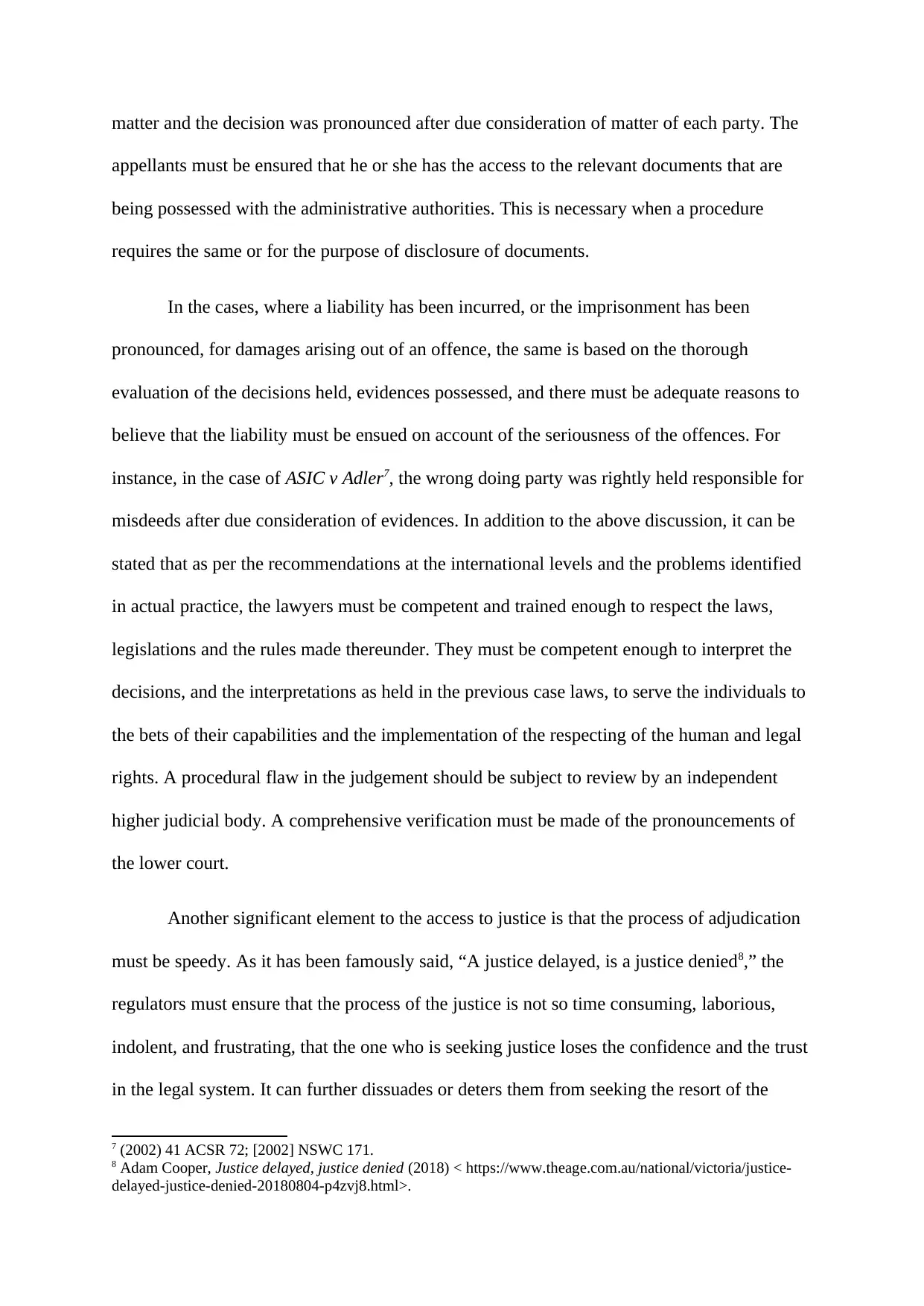
matter and the decision was pronounced after due consideration of matter of each party. The
appellants must be ensured that he or she has the access to the relevant documents that are
being possessed with the administrative authorities. This is necessary when a procedure
requires the same or for the purpose of disclosure of documents.
In the cases, where a liability has been incurred, or the imprisonment has been
pronounced, for damages arising out of an offence, the same is based on the thorough
evaluation of the decisions held, evidences possessed, and there must be adequate reasons to
believe that the liability must be ensued on account of the seriousness of the offences. For
instance, in the case of ASIC v Adler7, the wrong doing party was rightly held responsible for
misdeeds after due consideration of evidences. In addition to the above discussion, it can be
stated that as per the recommendations at the international levels and the problems identified
in actual practice, the lawyers must be competent and trained enough to respect the laws,
legislations and the rules made thereunder. They must be competent enough to interpret the
decisions, and the interpretations as held in the previous case laws, to serve the individuals to
the bets of their capabilities and the implementation of the respecting of the human and legal
rights. A procedural flaw in the judgement should be subject to review by an independent
higher judicial body. A comprehensive verification must be made of the pronouncements of
the lower court.
Another significant element to the access to justice is that the process of adjudication
must be speedy. As it has been famously said, “A justice delayed, is a justice denied8,” the
regulators must ensure that the process of the justice is not so time consuming, laborious,
indolent, and frustrating, that the one who is seeking justice loses the confidence and the trust
in the legal system. It can further dissuades or deters them from seeking the resort of the
7 (2002) 41 ACSR 72; [2002] NSWC 171.
8 Adam Cooper, Justice delayed, justice denied (2018) < https://www.theage.com.au/national/victoria/justice-
delayed-justice-denied-20180804-p4zvj8.html>.
appellants must be ensured that he or she has the access to the relevant documents that are
being possessed with the administrative authorities. This is necessary when a procedure
requires the same or for the purpose of disclosure of documents.
In the cases, where a liability has been incurred, or the imprisonment has been
pronounced, for damages arising out of an offence, the same is based on the thorough
evaluation of the decisions held, evidences possessed, and there must be adequate reasons to
believe that the liability must be ensued on account of the seriousness of the offences. For
instance, in the case of ASIC v Adler7, the wrong doing party was rightly held responsible for
misdeeds after due consideration of evidences. In addition to the above discussion, it can be
stated that as per the recommendations at the international levels and the problems identified
in actual practice, the lawyers must be competent and trained enough to respect the laws,
legislations and the rules made thereunder. They must be competent enough to interpret the
decisions, and the interpretations as held in the previous case laws, to serve the individuals to
the bets of their capabilities and the implementation of the respecting of the human and legal
rights. A procedural flaw in the judgement should be subject to review by an independent
higher judicial body. A comprehensive verification must be made of the pronouncements of
the lower court.
Another significant element to the access to justice is that the process of adjudication
must be speedy. As it has been famously said, “A justice delayed, is a justice denied8,” the
regulators must ensure that the process of the justice is not so time consuming, laborious,
indolent, and frustrating, that the one who is seeking justice loses the confidence and the trust
in the legal system. It can further dissuades or deters them from seeking the resort of the
7 (2002) 41 ACSR 72; [2002] NSWC 171.
8 Adam Cooper, Justice delayed, justice denied (2018) < https://www.theage.com.au/national/victoria/justice-
delayed-justice-denied-20180804-p4zvj8.html>.
Paraphrase This Document
Need a fresh take? Get an instant paraphrase of this document with our AI Paraphraser
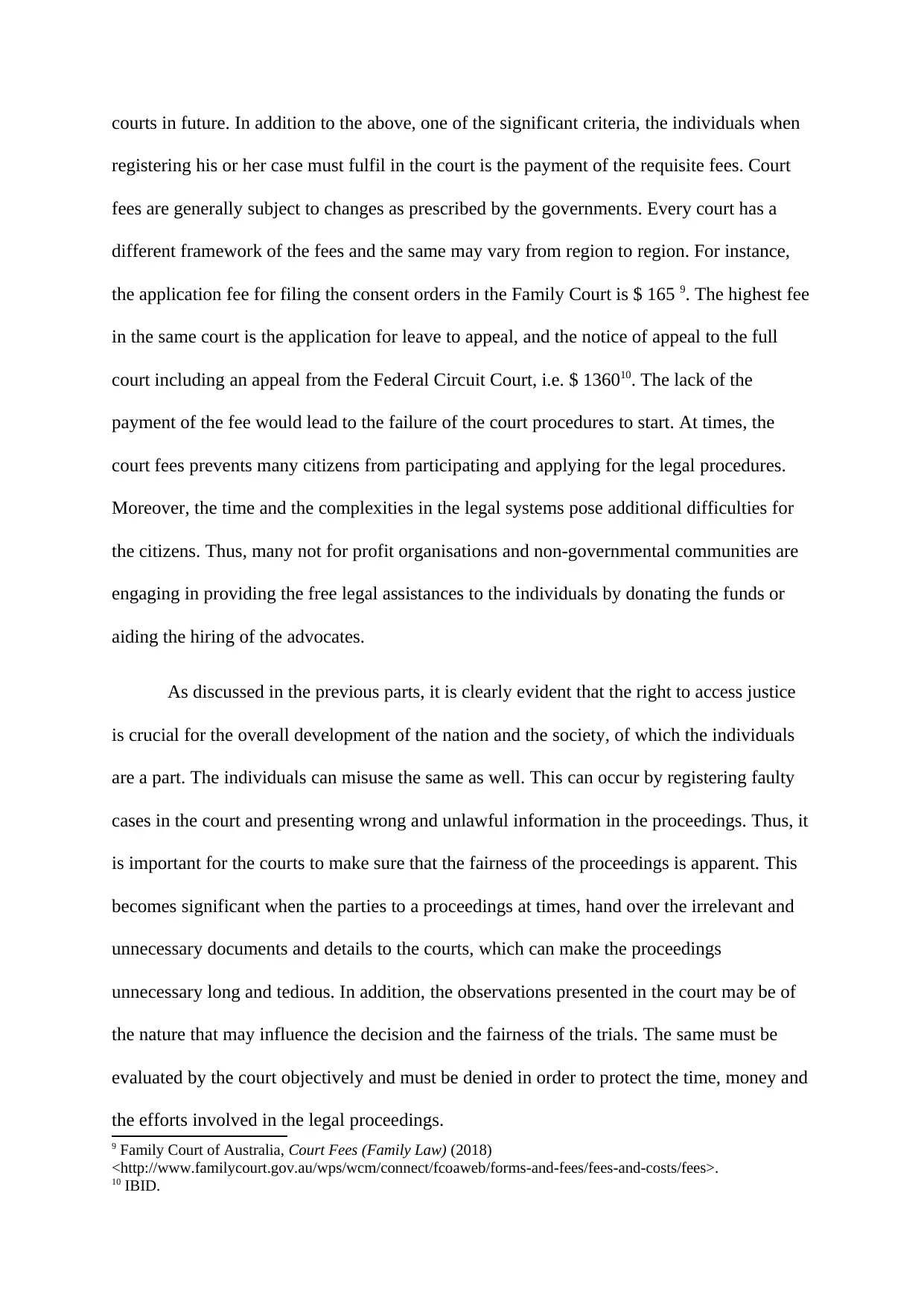
courts in future. In addition to the above, one of the significant criteria, the individuals when
registering his or her case must fulfil in the court is the payment of the requisite fees. Court
fees are generally subject to changes as prescribed by the governments. Every court has a
different framework of the fees and the same may vary from region to region. For instance,
the application fee for filing the consent orders in the Family Court is $ 165 9. The highest fee
in the same court is the application for leave to appeal, and the notice of appeal to the full
court including an appeal from the Federal Circuit Court, i.e. $ 136010. The lack of the
payment of the fee would lead to the failure of the court procedures to start. At times, the
court fees prevents many citizens from participating and applying for the legal procedures.
Moreover, the time and the complexities in the legal systems pose additional difficulties for
the citizens. Thus, many not for profit organisations and non-governmental communities are
engaging in providing the free legal assistances to the individuals by donating the funds or
aiding the hiring of the advocates.
As discussed in the previous parts, it is clearly evident that the right to access justice
is crucial for the overall development of the nation and the society, of which the individuals
are a part. The individuals can misuse the same as well. This can occur by registering faulty
cases in the court and presenting wrong and unlawful information in the proceedings. Thus, it
is important for the courts to make sure that the fairness of the proceedings is apparent. This
becomes significant when the parties to a proceedings at times, hand over the irrelevant and
unnecessary documents and details to the courts, which can make the proceedings
unnecessary long and tedious. In addition, the observations presented in the court may be of
the nature that may influence the decision and the fairness of the trials. The same must be
evaluated by the court objectively and must be denied in order to protect the time, money and
the efforts involved in the legal proceedings.
9 Family Court of Australia, Court Fees (Family Law) (2018)
<http://www.familycourt.gov.au/wps/wcm/connect/fcoaweb/forms-and-fees/fees-and-costs/fees>.
10 IBID.
registering his or her case must fulfil in the court is the payment of the requisite fees. Court
fees are generally subject to changes as prescribed by the governments. Every court has a
different framework of the fees and the same may vary from region to region. For instance,
the application fee for filing the consent orders in the Family Court is $ 165 9. The highest fee
in the same court is the application for leave to appeal, and the notice of appeal to the full
court including an appeal from the Federal Circuit Court, i.e. $ 136010. The lack of the
payment of the fee would lead to the failure of the court procedures to start. At times, the
court fees prevents many citizens from participating and applying for the legal procedures.
Moreover, the time and the complexities in the legal systems pose additional difficulties for
the citizens. Thus, many not for profit organisations and non-governmental communities are
engaging in providing the free legal assistances to the individuals by donating the funds or
aiding the hiring of the advocates.
As discussed in the previous parts, it is clearly evident that the right to access justice
is crucial for the overall development of the nation and the society, of which the individuals
are a part. The individuals can misuse the same as well. This can occur by registering faulty
cases in the court and presenting wrong and unlawful information in the proceedings. Thus, it
is important for the courts to make sure that the fairness of the proceedings is apparent. This
becomes significant when the parties to a proceedings at times, hand over the irrelevant and
unnecessary documents and details to the courts, which can make the proceedings
unnecessary long and tedious. In addition, the observations presented in the court may be of
the nature that may influence the decision and the fairness of the trials. The same must be
evaluated by the court objectively and must be denied in order to protect the time, money and
the efforts involved in the legal proceedings.
9 Family Court of Australia, Court Fees (Family Law) (2018)
<http://www.familycourt.gov.au/wps/wcm/connect/fcoaweb/forms-and-fees/fees-and-costs/fees>.
10 IBID.
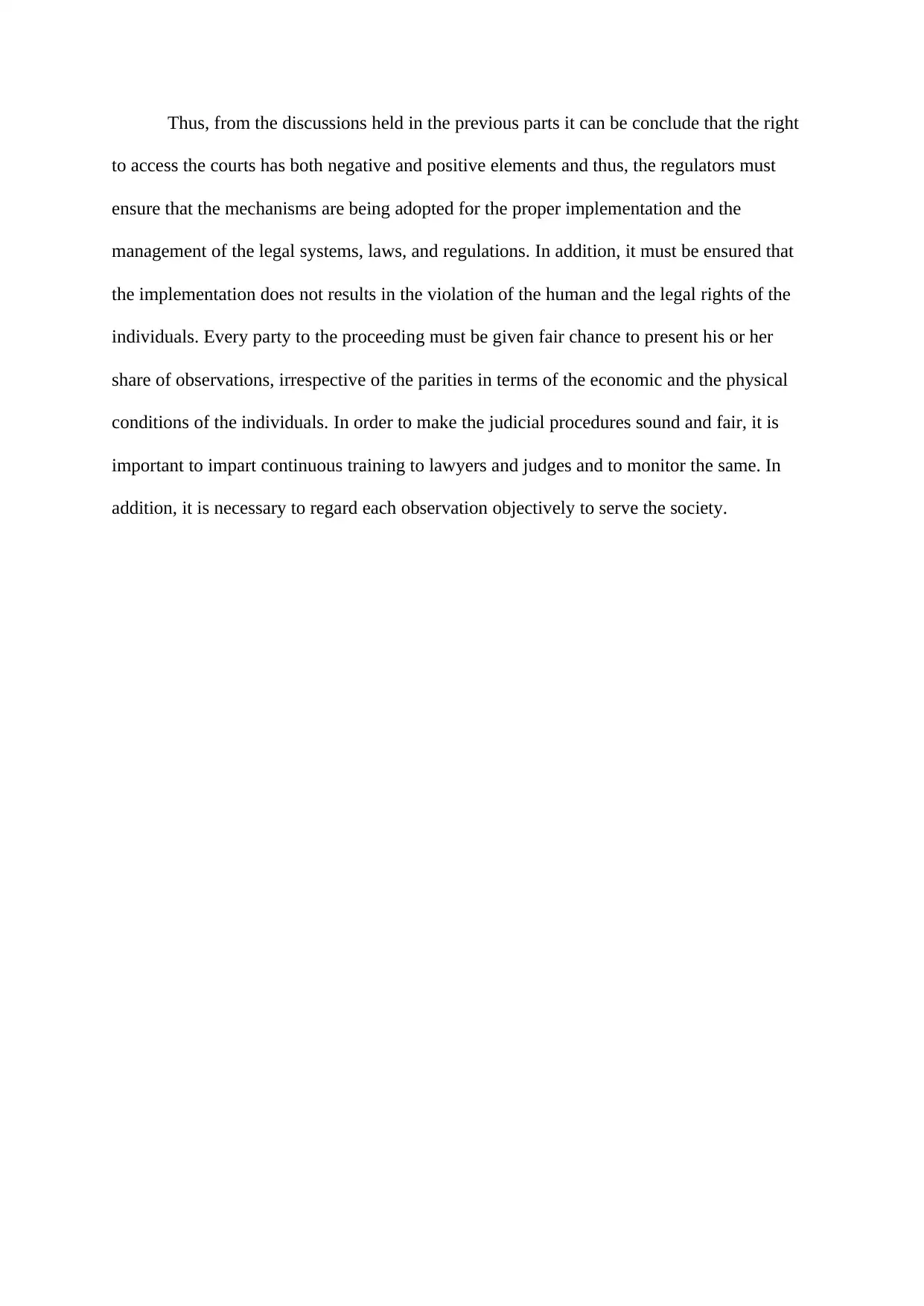
Thus, from the discussions held in the previous parts it can be conclude that the right
to access the courts has both negative and positive elements and thus, the regulators must
ensure that the mechanisms are being adopted for the proper implementation and the
management of the legal systems, laws, and regulations. In addition, it must be ensured that
the implementation does not results in the violation of the human and the legal rights of the
individuals. Every party to the proceeding must be given fair chance to present his or her
share of observations, irrespective of the parities in terms of the economic and the physical
conditions of the individuals. In order to make the judicial procedures sound and fair, it is
important to impart continuous training to lawyers and judges and to monitor the same. In
addition, it is necessary to regard each observation objectively to serve the society.
to access the courts has both negative and positive elements and thus, the regulators must
ensure that the mechanisms are being adopted for the proper implementation and the
management of the legal systems, laws, and regulations. In addition, it must be ensured that
the implementation does not results in the violation of the human and the legal rights of the
individuals. Every party to the proceeding must be given fair chance to present his or her
share of observations, irrespective of the parities in terms of the economic and the physical
conditions of the individuals. In order to make the judicial procedures sound and fair, it is
important to impart continuous training to lawyers and judges and to monitor the same. In
addition, it is necessary to regard each observation objectively to serve the society.
⊘ This is a preview!⊘
Do you want full access?
Subscribe today to unlock all pages.

Trusted by 1+ million students worldwide
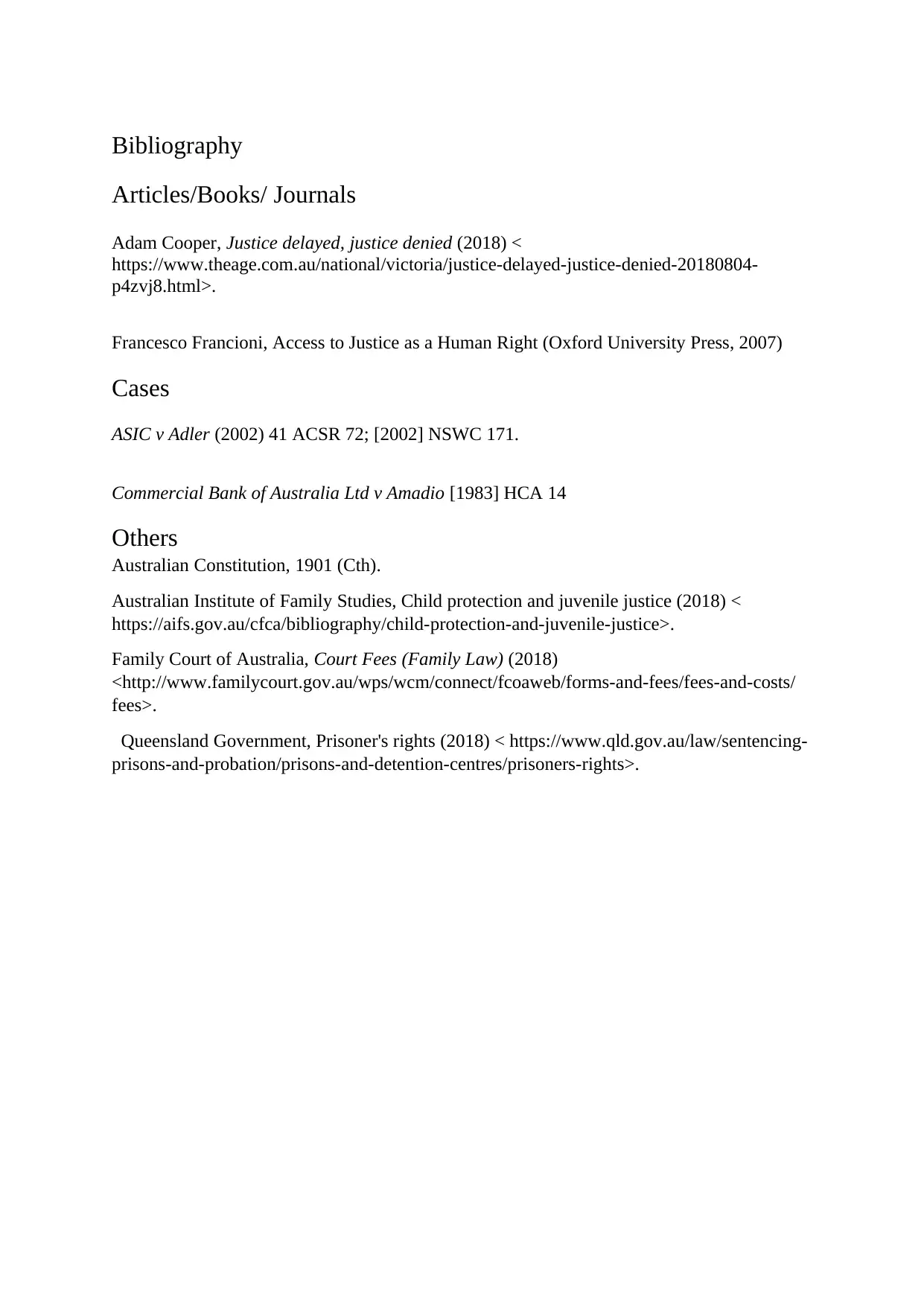
Bibliography
Articles/Books/ Journals
Adam Cooper, Justice delayed, justice denied (2018) <
https://www.theage.com.au/national/victoria/justice-delayed-justice-denied-20180804-
p4zvj8.html>.
Francesco Francioni, Access to Justice as a Human Right (Oxford University Press, 2007)
Cases
ASIC v Adler (2002) 41 ACSR 72; [2002] NSWC 171.
Commercial Bank of Australia Ltd v Amadio [1983] HCA 14
Others
Australian Constitution, 1901 (Cth).
Australian Institute of Family Studies, Child protection and juvenile justice (2018) <
https://aifs.gov.au/cfca/bibliography/child-protection-and-juvenile-justice>.
Family Court of Australia, Court Fees (Family Law) (2018)
<http://www.familycourt.gov.au/wps/wcm/connect/fcoaweb/forms-and-fees/fees-and-costs/
fees>.
Queensland Government, Prisoner's rights (2018) < https://www.qld.gov.au/law/sentencing-
prisons-and-probation/prisons-and-detention-centres/prisoners-rights>.
Articles/Books/ Journals
Adam Cooper, Justice delayed, justice denied (2018) <
https://www.theage.com.au/national/victoria/justice-delayed-justice-denied-20180804-
p4zvj8.html>.
Francesco Francioni, Access to Justice as a Human Right (Oxford University Press, 2007)
Cases
ASIC v Adler (2002) 41 ACSR 72; [2002] NSWC 171.
Commercial Bank of Australia Ltd v Amadio [1983] HCA 14
Others
Australian Constitution, 1901 (Cth).
Australian Institute of Family Studies, Child protection and juvenile justice (2018) <
https://aifs.gov.au/cfca/bibliography/child-protection-and-juvenile-justice>.
Family Court of Australia, Court Fees (Family Law) (2018)
<http://www.familycourt.gov.au/wps/wcm/connect/fcoaweb/forms-and-fees/fees-and-costs/
fees>.
Queensland Government, Prisoner's rights (2018) < https://www.qld.gov.au/law/sentencing-
prisons-and-probation/prisons-and-detention-centres/prisoners-rights>.
1 out of 7
Related Documents
Your All-in-One AI-Powered Toolkit for Academic Success.
+13062052269
info@desklib.com
Available 24*7 on WhatsApp / Email
![[object Object]](/_next/static/media/star-bottom.7253800d.svg)
Unlock your academic potential
Copyright © 2020–2025 A2Z Services. All Rights Reserved. Developed and managed by ZUCOL.




